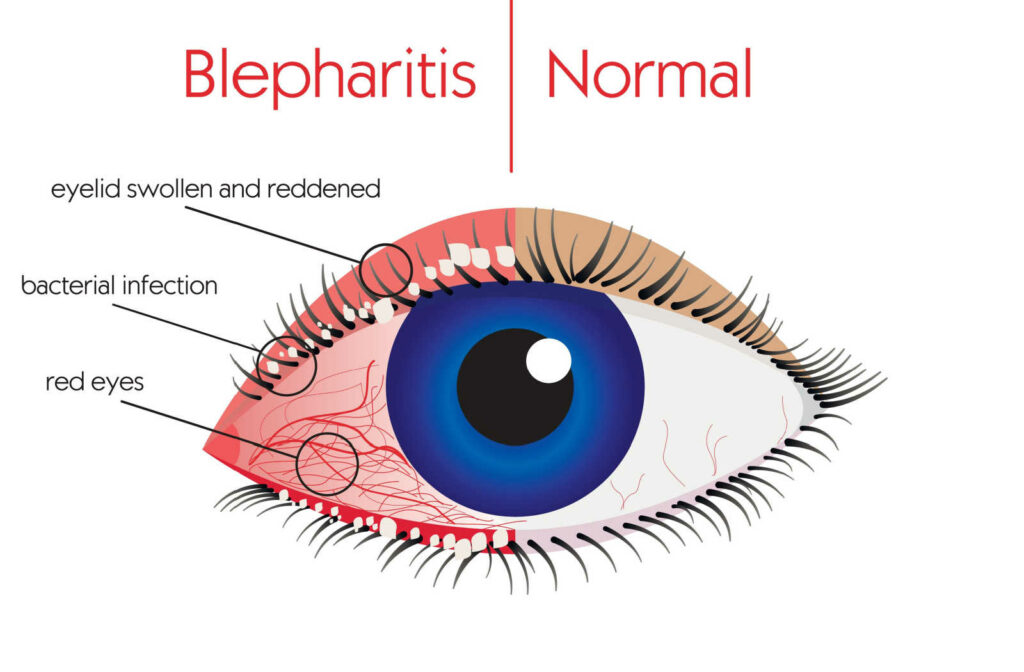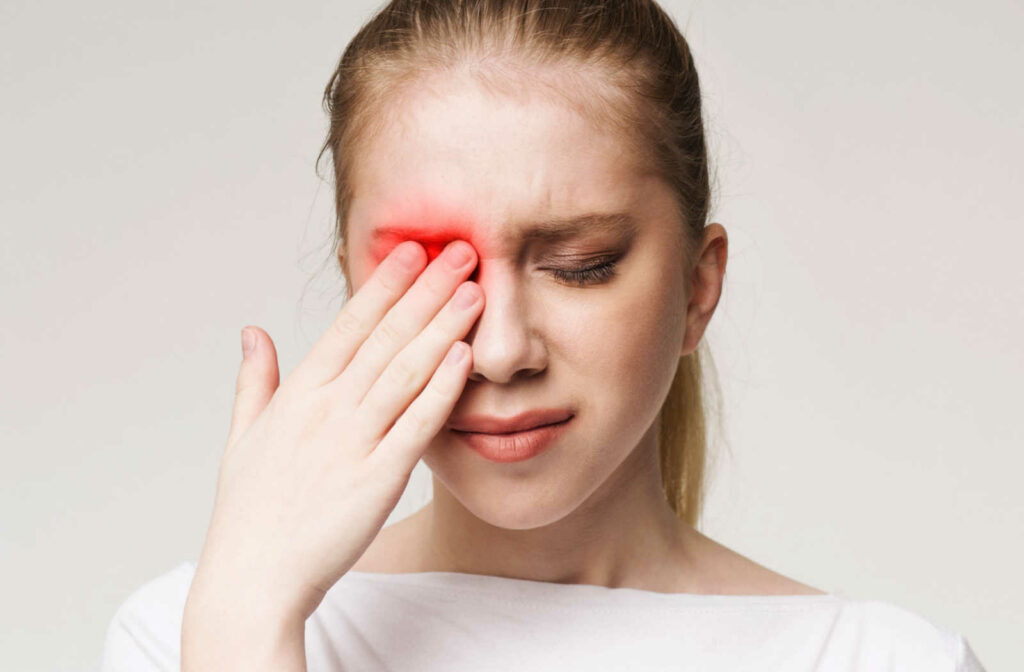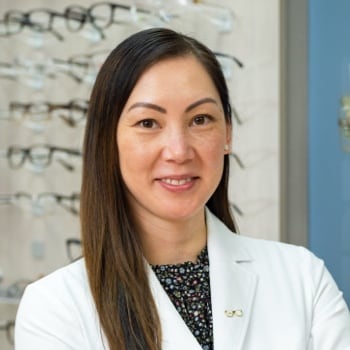Burning eyes can be a frustrating and uncomfortable experience. Whether it’s a mild irritation or severe pain before bed or when you wake up, it can be a frustrating part of your day. But what causes this burning sensation and how can we alleviate it?
There are a few things that could be causing this uncomfortable burning:
- Dry eye syndrome
- Blepharitis
- Allergies
- Eyes not closing fully while asleep
Because there are many possible reasons you may be experiencing burning eyes in the night or when you wake up, booking an appointment with your eye doctor can help determine the true cause. Once you know the reason for your discomfort, your optometrist can work with you to develop a personalized treatment.
Dry Eye Syndrome
One common cause of burning eyes is dry eye syndrome. This occurs when the eyes don’t produce enough tears, or good quality tears, to lubricate and nourish the eyes. This can happen for a variety of reasons including age, certain medications, and certain medical conditions.
Age
As we get older, our eyes naturally produce fewer tears, which can lead to dryness and discomfort.
Medications
Additionally, certain medications can contribute to dry eyes, such as:
- Antihistamines
- Antidepressants
- Blood pressure medication
Medical Conditions
Medical conditions such as Sjogren’s Syndrome, a chronic autoimmune disorder that affects the tear and salivary glands, can also cause dry eyes.
Symptoms of Dry Eye Disease
When the eyes are dry, the delicate tissues can become irritated and inflamed, leading to burning and discomfort. Dry eyes can also cause symptoms such as:
- Redness
- Stringy eye mucus
- Gritty feeling in the eyes
- Blurred vision
- Double vision
- Halos around lights
Types of Dry Eye Disease
There are also different types of dry eyes, including:
- Aqueous-deficient dry eyes: This type of dry eyes occurs when the eyes don’t produce enough tears.
- Evaporative dry eyes: This type of dry eyes occurs when the tears evaporate too quickly. This can happen when the eyelids don’t close properly, or when the oil glands near the lashes don’t produce enough oil to keep the tears from evaporating.
Treating Dry Eyes
Dry eye syndrome is a condition that can be managed but not cured. Treatment options include using artificial tears, lubricating eye drops, and ointments. In some cases, a doctor may recommend using a warm compress on the eyes, or a procedure called punctal occlusion to help keep the tears on the surface of the eyes for longer.

Blepharitis
Another potential cause of burning eyes is blepharitis. This condition is characterized by inflammation of the eyelids and can be caused by bacteria, oils, and debris accumulating on the eyelids.
Blepharitis can also cause symptoms such as crusting on the eyelashes, redness, and swelling of the eyelids, and eyelashes that are matted together. Blepharitis is different from dry eye syndrome in that it is primarily an eyelid issue, whereas dry eye syndrome is primarily a tear film issue.
Treatment for blepharitis often includes:
- Using a warm compress on the eyes
- Cleaning the eyelids with a warm, damp cloth
- Using eyelid scrubs or eyelid wipes.
In some cases, a doctor may prescribe antibiotics or other medications to help clear up the infection or inflammation.
Allergies
Allergies can also cause your eyes to burn. Allergens such as pollen, dust, and pet dander can get trapped on the surface of the eyes.
These allergens then cause inflammation and irritation, leading to burning and discomfort. If you have seasonal allergies, you may notice that your eyes burn more often during certain times of the year.
Here are some tips on how to treat allergies that affect your eyes:
- Keep windows and doors closed, especially during high pollen seasons.
- Use air filters in your home or bedroom to help remove allergens from the air.
- Keep pets out of the bedroom, as they can carry allergens on their fur.
- Wear a dust mask when cleaning or doing other activities that stir up allergens.
- Use a saline nasal spray to help flush out allergens from the nose and sinuses.
- Use antihistamines or decongestants to help reduce inflammation and congestion in the eyes, nose, and sinuses.
- Keep a humidifier in your bedroom to add moisture to the air. Dry air can exacerbate allergy symptoms and make burning eyes worse.
Eyes Not Closing Fully While Asleep
Lagophthalmos is a condition in which a person is unable to fully close their eyelids while sleeping. This can cause several problems, including dry eyes and irritation, as well as difficulty sleeping. One of the most common symptoms of lagophthalmos is burning eyes especially in the morning.
The burning sensation is caused by a lack of tear film on the surface of the eye. Tears are essential for keeping the eyes lubricated and protected from infection. When the eyelids can’t fully close, the tear film isn’t able to spread evenly over the eye, leading to dryness, irritation, and inflammation.
There are several possible causes of lagophthalmos, including facial nerve damage, congenital defects, and certain medical conditions such as Bell’s palsy, thyroid eye disease, and facial paralysis.
Treatment for lagophthalmos typically involves using lubricating eye drops or ointments to keep the eyes moist and wearing an eye patch or an eyelid weight at night to help keep the eyelids closed.
In some cases, surgery may be necessary to correct the underlying cause of the condition and repair the eyelid.
Get Help from Your Eye Doctor
Burning eyes can have many causes, including dry eye syndrome, blepharitis, allergies, and even a condition where the eyes don’t close all the way. It’s important to determine the underlying cause to effectively treat your condition.
If the burning persists or is accompanied by other symptoms, seek the advice of an eye care professional at Eyes on Plainville. Remember that proper care and attention to your eye health can help prevent and alleviate many eye problems, so it’s best to be proactive about your vision health.





